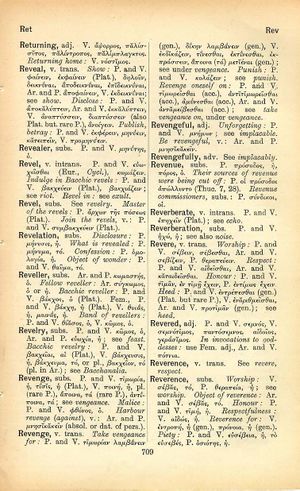revel: Difference between revisions
From LSJ
Φίλος με βλάπτων (λυπῶν) οὐδὲν ἐχθροῦ διαφέρει → Laedens amicus distat inimico nihil → Ein Freund, der schadet, ist ganz gelich mir einem Feind
(Woodhouse 4) |
(CSV4) |
||
| Line 1: | Line 1: | ||
{{ | {{Woodhouse1 | ||
| | |Text=[[File:woodhouse_709.jpg|thumb|link={{filepath:woodhouse_709.jpg}}]]'''v. intrans.''' | ||
P. and V. εὐωχεῖσθαι (Eur., ''Cycl.''), κωμάζειν. | |||
<b class="b2">Indulge in Bacchic revels</b>: P. and V. βακχεύειν (Plat.), βακχιάζειν; see [[riot]]. | |||
<b class="b2">Revel in</b>: see [[exult]]. | |||
'''subs.''' | |||
See [[revelry]]. | |||
<b class="b2">Master of the revels</b>: P. [[ἄρχων]] τῆς πόσεως (Plat.). | |||
<b class="b2">Join the revels</b>, v.: P. and V. συμβακχεύειν (Plat.). | |||
}} | }} | ||
Revision as of 09:50, 21 July 2017
English > Greek (Woodhouse)
v. intrans.
P. and V. εὐωχεῖσθαι (Eur., Cycl.), κωμάζειν. Indulge in Bacchic revels: P. and V. βακχεύειν (Plat.), βακχιάζειν; see riot. Revel in: see exult. subs. See revelry. Master of the revels: P. ἄρχων τῆς πόσεως (Plat.). Join the revels, v.: P. and V. συμβακχεύειν (Plat.).

